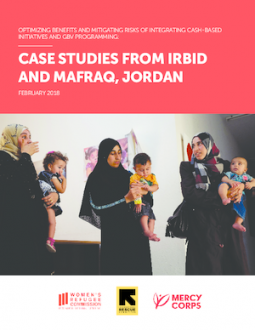
Case Studies from Irbid and Mafraq, Jordan
PublishedCash-based interventions (CBIs) are a rapidly growing form of humanitarian assistance and it is imperative that as cash assistance is scaled, protection risks are minimized and protection benefits maximized for affected individuals, households, and communities.
From 2016 to 2018 WRC undertook a project funded by the US State Department’s Bureau of Population, Refugees, and Migration (BPRM) to build the capacity of humanitarian actors to effectively mainstream GBV in CBIs and to utilize CBIs within GBV programming to meet the needs of displaced and marginalized groups, including women, adolescent girls, and persons with disabilities. Based on a literature review and key informant interviews (KIIs) with over 40 experts from more than 20 humanitarian agencies, the WRC developed guidance, tools, and
frameworks to help cash actors ensure the protection of beneficiaries from GBV risks throughout the program cycle. In partnership with Mercy Corps and IRC, field resources were piloted in Irbid, Jordan; additional pilots were conducted by WRC with Save the Children in Niger and with African Development Solutions (Adeso) in Somalia.


